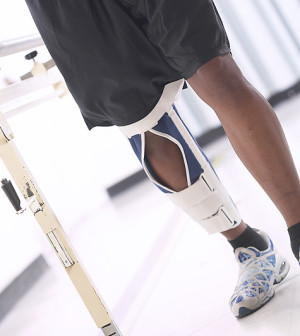- Could Your Grocery Store Meat Be Causing Recurring UTIs?
- Are You Making This Expensive Thermostat Error This Winter?
- Recognizing the Signs of Hypothyroidism
- 10 Strategies to Overcome Insomnia
- Could Artificial Sweeteners Be Aging the Brain Faster?
- Techniques for Soothing Your Nervous System
- Does the Water in Your House Smell Funny? Here’s Why
- Can a Daily Dose of Apple Cider Vinegar Actually Aid Weight Loss?
- 6 Health Beverages That Can Actually Spike Your Blood Sugar
- Treatment Options for Social Anxiety Disorder
Weakened Knees a Big Cause of Falls for Older People: Study

A new study supports what many American seniors may already know: that knee “instability” boosts their odds for a dangerous fall.
“Falls, injury from falls and poor balance confidence are extremely common and debilitating problems in older people,” said study author Michael Nevitt, a professor of epidemiology and biostatistics at the University of California, San Francisco.
“The present study has demonstrated for the first time that knee instability and knee buckling are important causes of these problems in the very large segment of the older population suffering from knee pain,” Nevitt added.
Therefore, doctors should make treating knee instability a priority among older patients, the researchers said.
Often triggered by weak muscles and poor balance, knee buckling is common among older people and those with knee osteoarthritis, the researchers explained. Along with sustaining serious injuries from falls, older people may develop fears about losing their balance and falling again.
The scientists examined the association between knee buckling among older people and their health and quality of life. The study involved more than 1,800 people whose average age was 67 when the study began. The participants either had knee osteoarthritis or were at high risk for the condition.
Knee buckling affected almost 17 percent of them at the end of five years. After seven years, 14 percent had recurrent falls, the study published Feb. 8 in Arthritis Care & Research found.
The researchers noted those whose knees “gave out” after five years were more than twice as likely to experience repeated falls, fear of falling and concerns about their balance two years later.
The participants who fell when their knee buckled at the beginning of the study were more than four times as likely to have experienced repeated falls in the next two years. They were also twice as likely to be seriously hurt in a fall. Their risk tripled for fall-related injuries that limit activities, and they were four times more likely to have balance issues, the researchers said.
“Fortunately, it may be possible to treat knee instability and prevent knee buckling with targeted exercises. Joint replacement surgery can also improve knee stability,” Nevitt said.
The researchers said doctors should talk to patients with knee osteoarthritis about their balance and whether their knees buckle.
These patients should then be counseled on protecting themselves from falls, including how to use walking aids, strengthen their legs and choose supportive shoes, they added.
More information
The U.S. National Institutes of Health provides more information on older people and falls.
Source: HealthDay
Copyright © 2026 HealthDay. All rights reserved.










